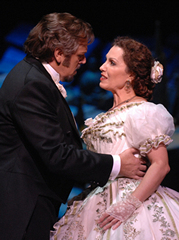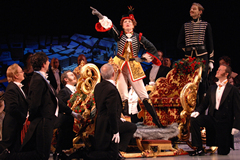| A rare and transcendent experience by Sarah Noble | |
| R. Strauss: Arabella Opera Australia Sydney Opera House 7 March 2008 | |
| Everything comes to a head at the Cabbies' Ball. Zdenka, taking her forgeries a step further, arranges a nocturnal liaison with Matteo, supposedly on her sister's behalf, but planning to be there herself instead. Mandryka overhears their conversation. Shattered, he misbehaves appallingly and nearly ruins everything - until a lengthy, confused confrontation in the hotel lobby eventually reveals all. Matteo conveniently transfers his affections to the newly female Zdenka and Arabella and her Mr. Right are at last betrothed. Strauss' opera intersperses hilarity with passages of real depth and emotional power, exploring both the comic possibilities of love and its complex, psychological side. Arabella is a fascinating, witty heroine, who laughingly flirts with her suitors without wavering in her determination to marry only for true love. The action hints at farce but never descends to it; Strauss' luscious, shimmering score paints true love in all its glory, and adds a touch of greatness to even the silliest moments. Opera Australia has done itself proud with this, its very first Arabella. John Cox's resplendently traditional production is a joy, presented with genuine insight and an eye for beauty. Behind the interior sets hovers a birds-eye diorama of Vienna, a quietly effective reminder of the larger world into which these individuals fit. His ball scene is a triumph of subtlety, merely hinting at the outskirts of a crowd rather than piling everybody in, as some directors might. Richard Hickox leads the orchestra in a beautifully shaped performance, sensitive but never subservient to the singers. Strauss' score offers many an opportunity for almost outrageous orchestral gorgeousness; Hickox grabs most of them, while steering admirably clear of total self-indulgence. Cheryl Barker is incandescent in the title role, a sweet, vivacious Arabella who sounds as heart-stoppingly exquisite as she looks. An actress of rare talent, she creates a three dimensional and immensely sympathetic character. Vocally the role fits her dark, lustrous tone and electrifying expressivity like an expensive silk glove. Having begun beautifully, her performance proceeds to gain in intensity as the performance proceeds, culminating in a climax and denouement of incredible impact. A true Sternstunde for a consistently excellent artist. | |
|
Emma Matthews' success as Zdenka is less complete. In Strauss' fast-paced recitatives she is in her element, bright-toned and bubbly. As her phrases grow longer and more lyrical, however, she flutters rather than soars; her quick vibrato and light tone, while basically appealing, don't quite do justice to all of Zdenka's music. Usually a pretty admirable actress, she falters in this quasi-pants role, squirming and posturing like Cherubino on a sugar rush; contrasted with the radiant stillness of Cheryl Barker's Arabella, her manner is all the more offputting. It is not until matters turn serious in the final act that her own usual poise and musical grace return. Richard Roberts is suitably lyrical and earnest as her Matteo, his clear and youthful tenor floating easily above the orchestra. Mezzo soprano Milijana Nikolic is wickedly wonderful as the extravagant Countess Waldner, her sonorous tone put to particularly good use. As her husband, Conal Coad is likewise in fine form, an endearingly mischievous compulsive gambler. Particularly impressive is Lorina Gore's star turn (and Opera Australia début) as Fiakermilli, tackling the role's fearsome coloratura with agility and impressive vocal clarity. Jacqueline Dark is an all-too-brief treat as a mercenary Fortune Teller. Only Kanen Breen is miscast, his unchanging brand of comedy, though suitable elsewhere, are trivial and irrelevant in Arabella and his voice is all but inaudible. Yet even a far greater misstep would have little impact on the overarching excellence of this Arabella. "How vain to separate the two. Words and music become as one, join together to form a new creation....Each art redeemed by the other!" So says the Countess Madeleine in the closing scene of another Strauss opera, his Capriccio. Asked to determine which is the most important aspect of opera, she cannot choose, she realises that there is no choice to be made - in its ideal form, opera combines the two to create something new and indivisible. With its new production of his elegant Viennese comedy Arabella, Opera Australia has achieved just this kind of alchemy. Very much more than the sum of its individually excellent parts, this Arabella is a rare and transcendent experience, not to be missed by those who have not seen it and unlikely to be forgotten by those who have. | |
| Text © Sarah Noble Photos © Branco Gaica |
 Arabella is the beloved daughter of the Waldners, an aristocratic family of rapidly diminishing means. Their survival depends on a good marriage for their daughter; Arabella has no shortage of suitors but steadfastly awaits "the right man". She finds him in Mandryka. But the Waldners have another daughter, Zdenka, who has been raised as a boy - bringing two daughters out in 19th century Viennese society would be far too expensive. Zdenka unrequitedly loves Arabella's most ardent admirer, Matteo, and forges letters to him from her sister which she passes on in her guise as "Zdenko", Arabella's sister and Matteo's confidant.
Arabella is the beloved daughter of the Waldners, an aristocratic family of rapidly diminishing means. Their survival depends on a good marriage for their daughter; Arabella has no shortage of suitors but steadfastly awaits "the right man". She finds him in Mandryka. But the Waldners have another daughter, Zdenka, who has been raised as a boy - bringing two daughters out in 19th century Viennese society would be far too expensive. Zdenka unrequitedly loves Arabella's most ardent admirer, Matteo, and forges letters to him from her sister which she passes on in her guise as "Zdenko", Arabella's sister and Matteo's confidant.  Singing Mandryka is Barker's real-life partner, baritone Peter Coleman-Wright. Unsurprisingly, the chemistry between the two is potent. When, in the duet "Und du wirst mein Gebieter sein", they pledge themselves to one another, the electricity is palpable. Indeed, it's hard to know whether to watch, amazed, or turn aside and give them their privacy. Coleman-Wright's Mandryka is a genial and appealing creation; what his voice lacks in outright splendour he makes up for in elegant phrasing and smooth, Straussian legato.
Singing Mandryka is Barker's real-life partner, baritone Peter Coleman-Wright. Unsurprisingly, the chemistry between the two is potent. When, in the duet "Und du wirst mein Gebieter sein", they pledge themselves to one another, the electricity is palpable. Indeed, it's hard to know whether to watch, amazed, or turn aside and give them their privacy. Coleman-Wright's Mandryka is a genial and appealing creation; what his voice lacks in outright splendour he makes up for in elegant phrasing and smooth, Straussian legato.